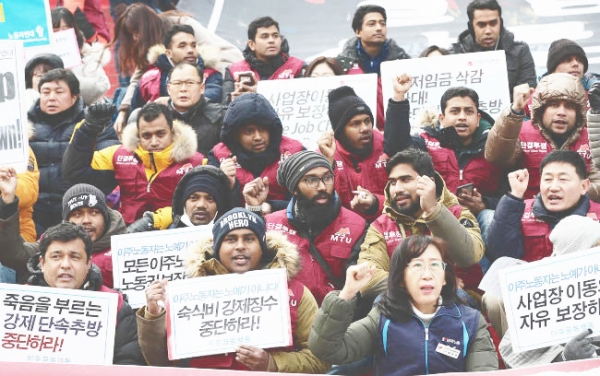
On Aug. 21, labor groups and migrant workers currently residing in Korea protested for the right to freely move their workplace, along with better working rights for foreign workers. Their main reasons for the protest were that they have been discriminated against for a lengthy period of time, and that the freedom that exists for native workers does not apply to them. Discrimination against migrant workers also appears in the current law. According to the current Foreign Employment Act, in the case of hiring foreign workers, the workers are not able to change their place of employent without permission from the owner.
In an interview by Kyunghyang Shinmun, migrant workers stated that although they worked from 6am to 5pm, their resting time was only an hour. They mentioned that they had to work without stopping in a vinyl greenhouse where temperatures rocketed up to as much as 39.6°C and 40.2°C. The labor union stated that there still are no measures to protect the rights of migrant workers, and unregistered foreign workers are not able to actively fight for their rights due to the fear that they will be deported.
According to a survey by Yonhap News Agency, 58.4% of migrant workers based in Korea cited language problems as their biggest trouble in adjusting to Korean society. Their second reason for having difficulty adjusting was discrimination against foreign workers. An interesting point is that the longer these workers resided in Korea, the more they experienced discrimination. These interviews and surveys show that the majority of foreign workers in Korea have experienced discrimination at one point or another, but do not have the means to claim their basic rights.
There are some causes as to why migrant workers experience such severe discrimination in Korean society. First is the portrayal of foreigners in Korean media. Steve Hamilton, chief of the International Organization for Migration to Korea, stated that the negative perception towards foreigners is mainly because local media outlets and politicians have opted to portray them negatively in many cases. In addition, Korean society is still largely homogenous, placing importance on the concept of monoethnicity. This has made many migrant workers feel that they are excluded from mainstream Korean society, and that they cannot fit in because their ethnicity is different. These causes have led migrant workers in Korea to experience discrimination more than workers in other nations.
With this problem acknowledged, many experts say that the attitude towards migrant workers must change for the better. The Korea Development Institute views that due to the population decrease of native Koreans, foreign workers can be a solution for the declining Korean workforce. They estimated that migrant workers will steadily increase, and migration laws and policies should change to accommodate the fast-paced increase of foreign workers. When migration laws change, along with laws related to foreign employment, and Korean society becomes more open towards people from outside their circle, migrant workers may finally find a home in Korea, where they previously found only hostility.


